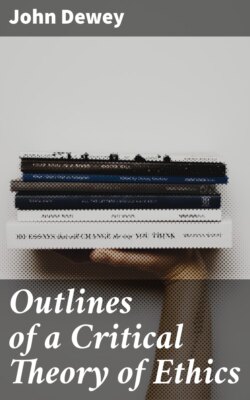Читать книгу Outlines of a Critical Theory of Ethics - Джон Дьюи - Страница 7
На сайте Литреса книга снята с продажи.
III.
ОглавлениеMeaning of Conduct.
Ethics then has to do with conduct or action viewed completely, or in relation to its end. But what is conduct? It must be distinguished from action in general; for any process of change, the working of a pump, the growth of a plant, the barking of a dog, may be called action. Conduct implies more than something taking place; it implies purpose, motive, intention; that the agent knows what he is about, that he has something which he is aiming at. All action accomplishes something or brings about results, but conduct has the result in view. It occurs for the sake of producing this result. Conduct does not simply, like action in general, have a cause, but also a reason, and the reason is present to the mind of the agent. There can be conduct only when there is a being who can propose to himself, as an end to be reached by himself, something which he regards as worth while. Such a being is a moral agent, and his action, when conscious, is conduct.
